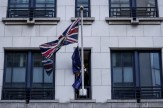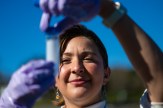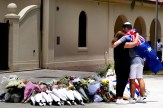Affirming a commitment to public service
Northeastern senior Brendan Rigby’s co-op helping persecuted Iraqi refugees seek resettlement in the United States was more than experiential-learning opportunity; it affirmed his commitment to public service.
The political science and international affairs dual major recently spent six months working at St. Andrew’s Refugee Services in Cairo, Egypt. The experience so inspired him that he plans to return to the legal clinic upon graduation this spring.
“There are people who need help out there, and to ignore them seems unconscionable,” said Rigby, who plans to attend law school in the fall. “Even the most desperate people in the United States usually have access to more and better services than refugees do.”
St. Andrew’s provides programming for refugees in 32 countries around the world, including Iraq, Somalia, and Sudan. Over the course of Rigby’s co-op, he listened to the stories of many Iraqi refugees who, because they had cooperated with Americans, had been forced out of their home country by members of Iraqi militias.
“They have a bull’s-eye on their back that reads, ‘Made in the USA,’” said Rigby.
Many of the refugees reported being threatened, kidnapped, beaten, raped, or electrocuted—traumatic events that change a person forever, said Rigby. Fearing for their lives, they fled to Egypt in the middle of the night with nothing but the clothes on their backs.
Once they reached Egypt, many encounter significant discrimination. “Some [Egyptian citizens] view them as unwelcome interference in the labor market,” explained Rigby. “And meeting [the refugees’] needs is a challenge for Egypt’s infrastructure.”
Rigby’s conviction that the United States has a moral obligation to help refugees fueled his work at St. Andrew’s. He wrote a successful grant proposal to a European organization that funds human rights initiatives in the region. He helped prepare resettlement documents on behalf of his clients and trained them for their resettlement interviews with Department of Homeland Security agents. And he assisted Sudanese asylum-seekers— many who were poor, single mothers lacking the resources to protect their children or take care of their own medical needs.
For Rigby, living and working in Egypt broadened his cultural perspective and made him question his own preconceived notions. “I had a vision for what Egypt would be like,” he said. “But you go there and you realize that all the strange, simplistic conceptions you had are hollow.”




